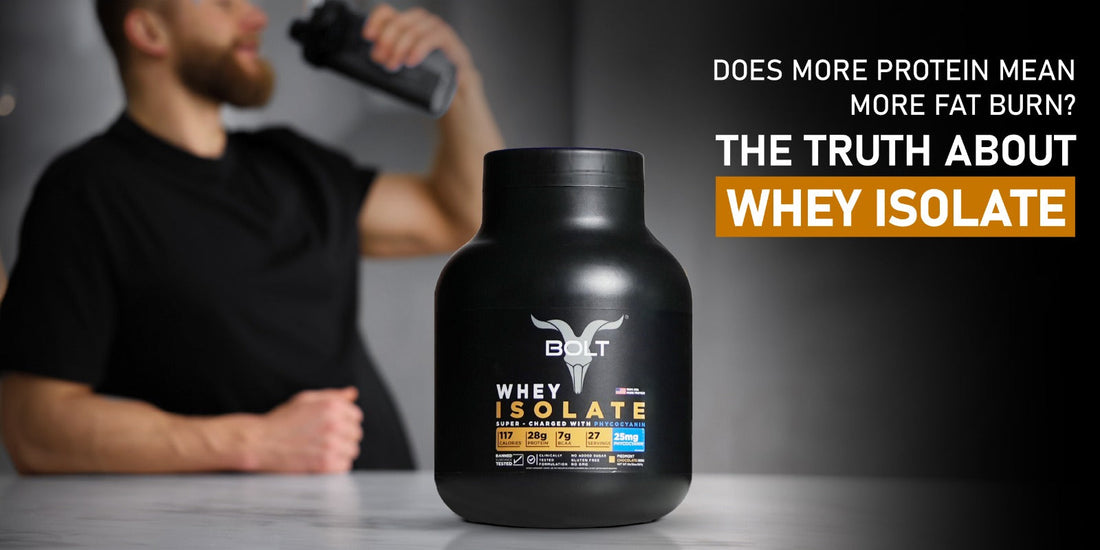
Does More Protein Mean More Fat Burn?
byProtein is a key nutrient in any diet, especially for those looking to build muscle, lose fat, or improve overall health. But does more protein mean more fat burn? And how does whey isolate fit into the equation? Let’s break down the science behind protein intake and its role in fat loss.
How Protein Affects Fat Burn
Protein plays a vital role in metabolism, muscle repair, and satiety. Here’s how increasing your protein intake—especially from sources like whey isolate—can contribute to fat loss:
1. Boosts Metabolism & Thermogenesis
- Protein has a higher thermic effect of food (TEF) compared to fats and carbs, meaning your body burns more calories digesting protein.
- Consuming more protein can increase calorie expenditure, helping with fat loss over time.
2. Preserves Lean Muscle Mass
- When you lose weight, your body may use muscle for energy. Whey isolate provides high-quality protein to help retain lean muscle while promoting fat loss.
- More muscle mass leads to a higher resting metabolic rate (RMR), which means you burn more calories even at rest.
3. Keeps You Full & Reduces Cravings
- Whey isolate is fast-digesting yet highly satiating, helping curb hunger and reduce unnecessary snacking.
- High-protein diets have been shown to lower ghrelin levels (the hunger hormone), making it easier to stay in a calorie deficit.
Why Whey Isolate is Best for Fat Loss
Unlike other protein sources, whey isolate is particularly effective for fat-burning due to its purity and absorption rate:
|
Factor |
Whey Isolate |
Other Protein Sources |
|
Protein Content |
90% or more |
Varies (60-80%) |
|
Lactose & Fat |
Very low |
Higher levels present |
|
Absorption Rate |
Rapid |
Moderate |
|
Effect on Lean Muscle |
High |
Moderate |
|
Suitability for Weight Loss |
Excellent |
Good |
Benefits of Whey Isolate Protein for Fat Loss:
✅ Low in calories, high in protein—ideal for calorie control.
✅ Fast absorption—perfect for post-workout recovery.
✅ Low lactose content—easy on digestion.
✅ Supports lean muscle retention—helps maintain a toned physique.

Does More Protein Always Mean More Fat Burn?
While increasing protein intake can aid fat loss, too much protein without a calorie deficit won’t lead to weight loss. To effectively burn fat:
- Stay in a calorie deficit: Consume fewer calories than you burn.
- Prioritize protein intake: Aim for 0.8-1.2g of protein per pound of body weight for fat loss.
- Combine with strength training: Build lean muscle to enhance metabolism.
- Choose high-quality sources: Whey isolate is one of the best options due to its high purity and effectiveness.

Conclusion: Should You Take More Whey Protein Isolate for Fat Loss?
Yes—but with balance! Whey protein isolate is an excellent tool for fat-burning when combined with the right diet and exercise plan. It helps boost metabolism, retain lean muscle, and curb hunger, making it easier to achieve weight loss goals.
Ready to Accelerate Your Fat Loss?
Incorporate high-quality whey isolate into your daily routine and start seeing real results. Check out our premium selection to fuel your fitness journey today!
FAQs: Whey Isolate & Fat Burning
1. Can whey protein isolate help me lose belly fat?
Yes! Whey protein isolate aids in overall fat loss, including belly fat, when combined with a proper diet and workout plan.
2. How much whey isolate protein powder should I take daily?
For fat loss, 20-30g per serving, 1-2 times a day, is ideal.
3. Is whey isolate protein better than whey concentrate for fat loss?
Yes. Whey isolate protein is lower in carbs and fat, making it a superior choice for weight loss.
4. Can I replace meals with whey isolate for weight loss?
Whey isolate is a supplement, not a meal replacement. It should be used to support a balanced diet.
5. When is the best time to take whey isolate?
Post-workout is the most effective time to take whey isolate for muscle recovery and fat loss.









